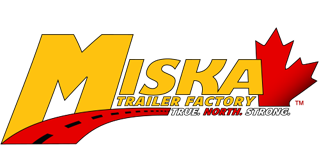MISKA TRAILERS
FREQUENTLY ASKED QUESTIONS
Have a question? Commonly asked questions are listed below with detailed answers. Need more info? Feel free to contact us anytime!
Frequently Asked Questions
- What is Gross Vehicle Weight Rating (GVWR)?
- What is Gross Axle Weight Rating (GAWR)?
- How Much Will My Trailer Carry?
- Can Miska Trailers™ Build me a Custom Trailer?
- Does Miska Trailers have a Service / Repair Department?
- Does Miska Trailer Trailers have the parts to repair my trailer myself?
- What Type of Hydraulic Fluid Should I Use?
- What are the differences/benefits between leaf springs and torsion type axles?
- What are the differences and benefits between electric and surge brakes?
- Will my vehicle be able to pull the trailer I want?
- Do I need brakes on a trailer?
- How do I maintain Wheel Bearings?
- Does Miska Trailers offer in-house financing?
- When do I require an annual safety inspection (aka Yellow Safety Sticker)?
What is Gross Vehicle Weight Rating (GVWR)?
The Gross Vehicle Weight Rating is maximum total weight of the fully loaded trailer including cargo. This weight rating must never be exceeded. (Back to Top)
What is Gross Axle Weight Rating (GAWR)?
The Gross Axle Weight Rating is maximum total weight to be carried by a single axle. This weight rating must never be exceeded. (Back to Top)
How Much Will My Trailer Carry?
Carrying capacity is calculated by taking the GVWR (Gross Vehicle Weight Rating) and subtracting the trailers empty weight (tare). The remaining balance is the legal payload. * EXAMPLE: 10,000 lbs. (GVWR) -minus 2,200 lbs. (Empty Weight) = 7,800 lbs. Payload (Back to Top)
Can Miska Trailers™ Build me a Custom Trailer?
Miska Trailers™ has the most diverse line of trailers available in the industry, as well as, custom manufacturing capabilities. Miska Trailers™ is a production based manufacturer, with unlimited ability to custom build any trailer to your specifications. You may contact our friendly sales department at 800-306-2111 with your questions and needs. (Back to Top)
Does Miska Trailers have a Service / Repair Department?
Miska Trailer™ Factory is your one-stop shop for trailer parts, service, repairs and accessories. We have qualified, certified mechanics and welders to repair any of your trailer needs. Whether you are looking to do the work yourself and need all the parts, or you want it done by the professionals, we have the parts and the skilled staff to get it done. We service all types, and all makes and models of trailers. (Back to Top)
Does Miska Trailer Trailers have the parts to repair my trailer myself?
Yes! Parts can be ordered online from our Parts Superstore and delivered to your door within days. Or you can come to the factory to pick them up yourself. Your Choice! (Back to Top)
What Type of Hydraulic Fluid Should I Use?
The recommended Hydraulic Fluid is AW 32, or equivalent. It is most commonly used with mobile equipment operating in environmentally-sensitive sites year-round. (Back to Top)
What are the differences/benefits between leaf springs and torsion type axles?
Majority of trailers have leaf-spring axles. However, torsion axles have been increasingly used due to their superiority in longevity, stability, and safety. Leaf springs provide cushion in a trailers suspension by attaching to axles with U-bolts. On torsion axle trailers, the cushioning function is built into the axle. Self-contained and sealed, torsion axles resist rust and corrosion better than traditional leaf spring axles. Torsion axle trailers lower the center of gravity of the load you are hauling, thereby providing more stability for the trailer, but if you have a flat tire a torsion axle requires a spare wheel before you are able to continue pulling the trailer. A torsion axle trailer also has the drawback of a low variable-rate, giving less flexibility when loaded or going over harsh terrain. Some experts say that leaf springs are the better option while torsion axles are the best option. (Back to Top)
What are the differences and benefits between electric and surge brakes?
Electric brakes are the most commonly used brake package with trailers, unless it is a boat trailer or watercraft hauling trailer, which mainly come with surge brakes because electric brakes can short out if the trailer is backed into the water. Electric brakes allow you to control them from the vehicle as were surge brakes rely on pressure being applied to the hitch to activate them. (Back to Top)
Will my vehicle be able to pull the trailer I want?
Each tow vehicle has a different tow capacity. You should always check your tow vehicle's owners manually to find the specifications for towing a trailer. (Back to Top)
Do I need brakes on a trailer?
It depends on the weight of the trailer, what you are hauling, and your provincial rules and regulations. Please refer to the Ministry of Transportation website. In Ontario, “a Trailer having a gross weight of 1,360 kilograms (3,000 Ibs) or more shall be equipped with brakes adequate to stop and to hold the vehicle.” (Back to Top)
How do I maintain Wheel Bearings?
All of our trailers come with EZ Lube axle spindles. All you have to do is remove the rubber plug on the wheel bearing dust cap and by using a standard grease gun, simply pump fresh grease into the bearings. This should be done a couple times a year depending on the amount of use. (Back to Top)
Does Miska Trailers offer in-house financing?
In-house financing is available on a select group of trailers and subject to approved credit. Contact one of our sales associates for more details. (Back to Top)
When do I require an annual safety inspection (aka Yellow Safety Sticker)?
You require an annual safety inspection if both your truck and trailer meet the following: The truck's actual weight, registered gross weight or gross vehicle weight rating exceeds 4,500 kilograms (9,920 lbs), or The actual weight of the truck, when added to the actual weight of the towed trailer or trailers exceeds 4,500 kilograms (9,920 lbs), or The gross vehicle weight rating of the truck, when added to the gross vehicle weight rating of the towed trailer or trailers exceeds 4,500 (9,920 lbs) kilograms. (Back to Top)

